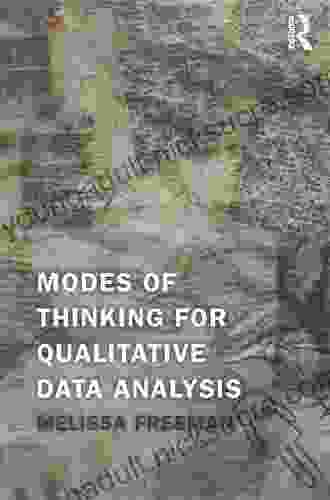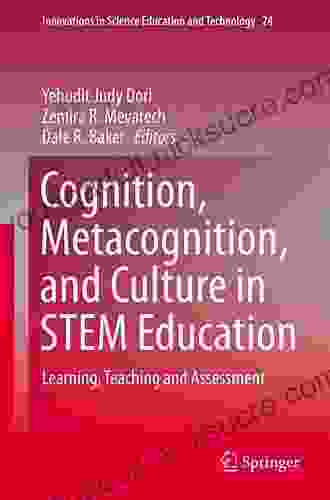Cognition Metacognition and Culture in Stem Education: Exploring the Interconnections and Implications for Instruction

4.2 out of 5
| Language | : | English |
| File size | : | 11725 KB |
| Text-to-Speech | : | Enabled |
| Screen Reader | : | Supported |
| Enhanced typesetting | : | Enabled |
| Word Wise | : | Enabled |
| Print length | : | 398 pages |
STEM education is a critical component of preparing students for the 21st-century workforce. However, research has shown that students often struggle with STEM subjects, and this is particularly true for students from underrepresented groups. One reason for this is that STEM learning requires students to use higher-order cognitive skills, such as problem-solving, critical thinking, and metacognition.
Cognition is the mental process of acquiring knowledge and understanding. It involves a variety of skills, such as attention, memory, perception, and language. Metacognition is the ability to think about one's own thinking. It involves skills such as planning, monitoring, and evaluating one's own learning.
Culture is the shared beliefs, values, and practices of a group of people. It can have a significant impact on how students learn and think. For example, some cultures emphasize the importance of cooperation, while others emphasize the importance of individualism. This can affect how students approach STEM learning.
The interconnections between cognition, metacognition, and culture are complex. However, research has shown that these factors are all important for STEM learning.
The Role of Cognition in STEM Learning
Cognition is essential for STEM learning. Students need to be able to use higher-order cognitive skills, such as problem-solving, critical thinking, and metacognition, in order to succeed in STEM subjects.
For example, problem-solving is a critical skill for STEM learning. Students need to be able to identify problems, generate solutions, and evaluate the effectiveness of their solutions. Critical thinking is also important for STEM learning. Students need to be able to analyze information, identify patterns, and draw s.
Metacognition is also essential for STEM learning. Students need to be able to plan, monitor, and evaluate their own learning. This involves being able to set goals, track their progress, and identify areas where they need to improve.
The Importance of Metacognition in STEM Learning
Metacognition is essential for STEM learning because it allows students to take control of their own learning. Metacognitive skills help students to identify their strengths and weaknesses, set goals, and develop strategies for improving their learning.
For example, a student who is aware of their own strengths and weaknesses can choose to focus on areas where they need to improve. A student who is able to set goals can track their progress and make adjustments as needed. A student who is able to develop strategies for improving their learning can find ways to make learning more effective and efficient.
Research has shown that metacognition is a key factor in STEM learning. Students who are able to metacognition are more likely to succeed in STEM subjects.
The Influence of Culture on STEM Learning
Culture can have a significant impact on STEM learning. For example, some cultures emphasize the importance of cooperation, while others emphasize the importance of individualism. This can affect how students approach STEM learning.
For example, in a culture that emphasizes cooperation, students may be more likely to work together on STEM projects. In a culture that emphasizes individualism, students may be more likely to work individually on STEM projects.
Culture can also affect how students view STEM subjects. For example, in a culture that values STEM subjects, students may be more likely to view STEM subjects as important and worthwhile. In a culture that does not value STEM subjects, students may be more likely to view STEM subjects as unimportant and boring.
It is important for educators to be aware of the influence of culture on STEM learning. Educators can use this knowledge to create learning environments that are culturally responsive and that support all students in their STEM learning.
Practical Implications for STEM Instruction
The research on cognition, metacognition, and culture has a number of implications for STEM instruction. First, it is important for educators to understand the role of cognition in STEM learning. Educators can use this knowledge to design instruction that is cognitively demanding and that helps students to develop the higher-order cognitive skills that they need to succeed in STEM subjects.
Second, it is important for educators to emphasize the importance of metacognition in STEM learning. Educators can use this knowledge to teach students metacognitive skills, such as planning, monitoring, and evaluating their own learning. This will help students to take control of their own learning and to become more independent learners.
Third, it is important for educators to be aware of the influence of culture on STEM learning. Educators can use this knowledge to create learning environments that are culturally responsive and that support all students in their STEM learning.
By understanding the interconnections between cognition, metacognition, and culture, educators can create STEM learning environments that are effective for all students.
Cognition, metacognition, and culture are all important factors in STEM learning. By understanding the interconnections between these factors, educators can create STEM learning environments that are effective for all students.
4.2 out of 5
| Language | : | English |
| File size | : | 11725 KB |
| Text-to-Speech | : | Enabled |
| Screen Reader | : | Supported |
| Enhanced typesetting | : | Enabled |
| Word Wise | : | Enabled |
| Print length | : | 398 pages |
Do you want to contribute by writing guest posts on this blog?
Please contact us and send us a resume of previous articles that you have written.
 Fiction
Fiction Non Fiction
Non Fiction Romance
Romance Mystery
Mystery Thriller
Thriller SciFi
SciFi Fantasy
Fantasy Horror
Horror Biography
Biography Selfhelp
Selfhelp Business
Business History
History Classics
Classics Poetry
Poetry Childrens
Childrens Young Adult
Young Adult Educational
Educational Cooking
Cooking Travel
Travel Lifestyle
Lifestyle Spirituality
Spirituality Health
Health Fitness
Fitness Technology
Technology Science
Science Arts
Arts Crafts
Crafts DIY
DIY Gardening
Gardening Petcare
Petcare Eli Wilson
Eli Wilson Tim O Connor
Tim O Connor Elly Molina
Elly Molina J D Swanson
J D Swanson Muako Maepa
Muako Maepa Scott Alan Johnston
Scott Alan Johnston John B Nici
John B Nici Donald N Yates
Donald N Yates Stefan Hunziker
Stefan Hunziker Greg Prato
Greg Prato Natalie Rhodes
Natalie Rhodes Shreya Ramachandran
Shreya Ramachandran Tim Larkin
Tim Larkin Karen Elliott House
Karen Elliott House Humberto G Garcia
Humberto G Garcia Tom Chatfield
Tom Chatfield Patrick M Lencioni
Patrick M Lencioni James Quinn
James Quinn Eugene P Northrop
Eugene P Northrop Tj Faultz
Tj Faultz Thomas Gilovich
Thomas Gilovich Jo May
Jo May Danil Zburivsky
Danil Zburivsky Wayne Mcghie
Wayne Mcghie Latonya J Trotter
Latonya J Trotter Joy Williams
Joy Williams Daddilife Books
Daddilife Books Christopher Nyerges
Christopher Nyerges Brian Cain
Brian Cain Ben Bleiweiss
Ben Bleiweiss Guy Evans
Guy Evans Matthew D Dewar
Matthew D Dewar Marilyn Burgos
Marilyn Burgos Lutz Hanseroth
Lutz Hanseroth Marc Charles
Marc Charles Dan Ariely
Dan Ariely Jeanne Godfrey
Jeanne Godfrey Bob Gordon
Bob Gordon Katrina Cope
Katrina Cope Robin Ray Green
Robin Ray Green Siena Cherson Siegel
Siena Cherson Siegel Lois A Ritter
Lois A Ritter Ron Douglas
Ron Douglas Tigran Bagdasaryan
Tigran Bagdasaryan Tristan Higbee
Tristan Higbee Michael Tomasello
Michael Tomasello Lindsay Ford
Lindsay Ford Tanya Lee Stone
Tanya Lee Stone Rashaun Johnson
Rashaun Johnson Chip Heath
Chip Heath Marie Myung Ok Lee
Marie Myung Ok Lee Lawrence Goldstone
Lawrence Goldstone George Johnson
George Johnson Barry Pickthall
Barry Pickthall John Samuel Barnett
John Samuel Barnett Sandy Tolan
Sandy Tolan Ruth Benedict
Ruth Benedict Stephen Grossberg
Stephen Grossberg Wynne Foster
Wynne Foster Janet Menzies
Janet Menzies Belinda Norton
Belinda Norton David E Jones
David E Jones Mark Kernion
Mark Kernion Mark Rosenman
Mark Rosenman Martin Volken
Martin Volken Cory Mortensen
Cory Mortensen Jodi Picoult
Jodi Picoult Joshua Clark
Joshua Clark Rawdon Wyatt
Rawdon Wyatt Dave Duncan
Dave Duncan Sylvester Nemes
Sylvester Nemes Manik Joshi
Manik Joshi Angela Leslee
Angela Leslee Jon Ronson
Jon Ronson Karl Beecher
Karl Beecher Gregory J Davenport
Gregory J Davenport Howell Raines
Howell Raines Harry Fairhead
Harry Fairhead Jeremy Klaff
Jeremy Klaff Chris Chelios
Chris Chelios Jeff Mach
Jeff Mach G K Derosa
G K Derosa Angelo Lowery
Angelo Lowery Andrea Lankford
Andrea Lankford Andy Mitchell
Andy Mitchell Mirabai Starr
Mirabai Starr Stephen Rea
Stephen Rea Gary B Meisner
Gary B Meisner Robin Benway
Robin Benway Warren St John
Warren St John Teresa Parker
Teresa Parker Peter Gibson
Peter Gibson Raynor Winn
Raynor Winn Emily Nielson
Emily Nielson Dawn Griffiths
Dawn Griffiths Robin Yocum
Robin Yocum Ruby Lang
Ruby Lang Dwight E Neuenschwander
Dwight E Neuenschwander Kyle Graves
Kyle Graves Stephen Jungmann
Stephen Jungmann Donna Mott
Donna Mott K Moriyasu
K Moriyasu Julia Reed
Julia Reed Jim Saccomano
Jim Saccomano Tania N Shah
Tania N Shah Ellen Frank
Ellen Frank Mtg Editorial Board
Mtg Editorial Board Carlos Acevedo
Carlos Acevedo Jordan Summers
Jordan Summers Kristen Jervis Cacka
Kristen Jervis Cacka Margaret M Quinlan
Margaret M Quinlan Rosie Daley
Rosie Daley Mark Shepherd
Mark Shepherd David C Keehn
David C Keehn Tim Hannigan
Tim Hannigan Kathy Freston
Kathy Freston Aaron Wilson
Aaron Wilson Donna Helen Crisp Jd Msn Rn Pmhcns Bc
Donna Helen Crisp Jd Msn Rn Pmhcns Bc Keith Elliot Greenberg
Keith Elliot Greenberg Elizabeth Kaledin
Elizabeth Kaledin Oliver Burkeman
Oliver Burkeman Eliot Schrefer
Eliot Schrefer Jodi Shabazz
Jodi Shabazz Richard G Brown
Richard G Brown Erin Moulton
Erin Moulton Tea Rozman Clark
Tea Rozman Clark Kevin J Gaston
Kevin J Gaston Mark W Steege
Mark W Steege Mark Lester
Mark Lester Derek M Steinbacher
Derek M Steinbacher Avinash Navlani
Avinash Navlani Joseph Mazur
Joseph Mazur Bill Schneider
Bill Schneider Jenny Smith
Jenny Smith Nikki Ace
Nikki Ace Rebecca Solnit
Rebecca Solnit Anna Rashbrook
Anna Rashbrook Andy Crowe
Andy Crowe T L Payne
T L Payne Mike Chambers
Mike Chambers Otto Rahn
Otto Rahn Schoolhouse Heaven
Schoolhouse Heaven Ellen J Langer
Ellen J Langer Elizabeth Foss
Elizabeth Foss Angelo Chiari
Angelo Chiari William E Hearn
William E Hearn David Graeber
David Graeber Scott Turner
Scott Turner Mark Remy
Mark Remy Angela C Wu
Angela C Wu Thomas Golf
Thomas Golf Steve Hindman
Steve Hindman Frederick Aardema
Frederick Aardema Mometrix
Mometrix Richard Lee Byers
Richard Lee Byers Nicholas Epley
Nicholas Epley Cynthia Nims
Cynthia Nims David Kinney
David Kinney Robert Lindsay
Robert Lindsay Andy Jurinko
Andy Jurinko Mercedes Pollmeier
Mercedes Pollmeier Rachel Kowert
Rachel Kowert Israelin Shockness
Israelin Shockness Stacy Mccullough
Stacy Mccullough Stephen Lynch
Stephen Lynch Rufus Estes
Rufus Estes Arlin Smith
Arlin Smith Thais Nye Derich
Thais Nye Derich Pete Dunne
Pete Dunne Andy Schell
Andy Schell Jim Prime
Jim Prime Ben Ehrenreich
Ben Ehrenreich Shenila Khoja Moolji
Shenila Khoja Moolji Neil Hawkesford
Neil Hawkesford Ben Campbell
Ben Campbell Forrest Maready
Forrest Maready Scott Meyer
Scott Meyer Robert Kirk
Robert Kirk Tirzah Price
Tirzah Price Colby Coombs
Colby Coombs Nicole Smith
Nicole Smith Kristina Statler
Kristina Statler Charlotte Klaar Phd
Charlotte Klaar Phd Lisa Marie Mercer
Lisa Marie Mercer L S Boos
L S Boos Kristen S Kurland
Kristen S Kurland M J Fievre
M J Fievre Wendy Rosenoff
Wendy Rosenoff Rick Vaive
Rick Vaive Joe Berardi
Joe Berardi Bernd Heinrich
Bernd Heinrich Samuel B Green
Samuel B Green Ashley Rickards
Ashley Rickards Lin Wellford
Lin Wellford Florian Freistetter
Florian Freistetter Caryl Say
Caryl Say Sabbithry Persad Mba
Sabbithry Persad Mba Roland A Boucher
Roland A Boucher Cheryl Alkon
Cheryl Alkon Kevin Hunter
Kevin Hunter Deborah Wall
Deborah Wall Judea Pearl
Judea Pearl Ryan Beck
Ryan Beck Yuu Tanaka
Yuu Tanaka Erich Fromm
Erich Fromm Rebecca Boggs Roberts
Rebecca Boggs Roberts Meg Long
Meg Long Laura Hillman
Laura Hillman Mitch Horowitz
Mitch Horowitz Tovah Feldshuh
Tovah Feldshuh Christian Wiggins
Christian Wiggins Richard Bate
Richard Bate Keylee C Hargis
Keylee C Hargis Afra J Zomorodian
Afra J Zomorodian Jay Matthews
Jay Matthews Joe Peta
Joe Peta Jeffrey Thurston
Jeffrey Thurston Kenneth R Ginsburg
Kenneth R Ginsburg Frank Deford
Frank Deford Dennis Rainey
Dennis Rainey Kim Dragoner
Kim Dragoner Susan Burton
Susan Burton Rebecca P Cohen
Rebecca P Cohen Nicholas D Kristof
Nicholas D Kristof United States Government Us Army
United States Government Us Army James M Johnston
James M Johnston Tina Nelson
Tina Nelson Stuart Lawrence
Stuart Lawrence Hajime Isayama
Hajime Isayama Milton Roth
Milton Roth Charney Herst
Charney Herst Bob Clouser
Bob Clouser Fredrik Backman
Fredrik Backman Christina Reese
Christina Reese Chanel Craft Tanner
Chanel Craft Tanner Catherine Mccord
Catherine Mccord Lisa Preston
Lisa Preston Johnny Molloy
Johnny Molloy Nicholas Jubber
Nicholas Jubber Murtaza Haider
Murtaza Haider Dan Heath
Dan Heath Ken Dryden
Ken Dryden Patrick Ejeke
Patrick Ejeke Andy Puddicombe
Andy Puddicombe Dr Eva Beaulieu
Dr Eva Beaulieu Michael Anthony
Michael Anthony Karl E Peace
Karl E Peace Baby Professor
Baby Professor Liv Ryan
Liv Ryan George Megre
George Megre Richard Hibshman
Richard Hibshman Mandee Heller Adler
Mandee Heller Adler Tara Sim
Tara Sim Phil Burt
Phil Burt Kari Marie Norgaard
Kari Marie Norgaard Andy Tyson
Andy Tyson Mark Verstegen
Mark Verstegen Dave Smith
Dave Smith Jonathan Gottschall
Jonathan Gottschall Stephanie Land
Stephanie Land Keith Crowley
Keith Crowley Ray Walker
Ray Walker Joan Jacobs Brumberg
Joan Jacobs Brumberg Capn Fatty Goodlander
Capn Fatty Goodlander Diana Nyad
Diana Nyad Tovar Cerulli
Tovar Cerulli George Noory
George Noory Rob Willson
Rob Willson Jennifer Bohnet
Jennifer Bohnet Germano Dalcielo
Germano Dalcielo Jay Griffiths
Jay Griffiths Pete Sampras
Pete Sampras Michele Borba
Michele Borba Mark Wells
Mark Wells Dhonielle Clayton
Dhonielle Clayton Rodney Castleden
Rodney Castleden Emma Dalton
Emma Dalton Judith S Beck
Judith S Beck Ariel Henley
Ariel Henley Viviana Altuve
Viviana Altuve Irene Gut Opdyke
Irene Gut Opdyke Jenna Helwig
Jenna Helwig Rebecca Hemmings
Rebecca Hemmings Madeleine Roux
Madeleine Roux Elizabeth Hunter
Elizabeth Hunter Ed Stafford
Ed Stafford Angela Smith
Angela Smith Rebecca Serle
Rebecca Serle Yvonne Choquet Bruhat
Yvonne Choquet Bruhat Andy Farrell
Andy Farrell Stewart Shapiro
Stewart Shapiro Linda Sivertsen
Linda Sivertsen Angelina J Steffort
Angelina J Steffort Michael Driscoll
Michael Driscoll Carlo Rovelli
Carlo Rovelli Rachel Connelly
Rachel Connelly Ron Jeffries
Ron Jeffries Jeffrey Bernstein
Jeffrey Bernstein Connie Schultz
Connie Schultz Samir P Desai
Samir P Desai Jason Hogan
Jason Hogan Jamie Kuykendall
Jamie Kuykendall Chef Maggie Chow
Chef Maggie Chow Angelo Tropea
Angelo Tropea Scott Stillman
Scott Stillman Douglas Henderson Jr
Douglas Henderson Jr Jim Posewitz
Jim Posewitz Louis Martin
Louis Martin George E Hein
George E Hein Jane M Healy
Jane M Healy Mark J Musser
Mark J Musser Eric Schmitz
Eric Schmitz Margaret Jordan Halter
Margaret Jordan Halter Angeline Boulley
Angeline Boulley R E Burrillo
R E Burrillo Patrick Pickens
Patrick Pickens Alessio Mangoni
Alessio Mangoni Richard L Sites
Richard L Sites Robert E Stake
Robert E Stake Rod Powers
Rod Powers W Todd Woodard
W Todd Woodard Jeffrey Lee
Jeffrey Lee Jonah Lehrer
Jonah Lehrer Angela Stancar Johnson
Angela Stancar Johnson Marie Brennan
Marie Brennan Christopher O Kennon
Christopher O Kennon John Geiger
John Geiger Sir Edmund Hillary
Sir Edmund Hillary Beth A Leonard
Beth A Leonard Kim Foley Mackinnon
Kim Foley Mackinnon Sam Fury
Sam Fury Kelly Corrigan
Kelly Corrigan Robyn Ryle
Robyn Ryle Matt Vincent
Matt Vincent Warren Sande
Warren Sande Tim Macwelch
Tim Macwelch S L Macgregor Mathers
S L Macgregor Mathers Kat Anderson
Kat Anderson Robert Dudley
Robert Dudley Lynn Lyons
Lynn Lyons Roger Craig
Roger Craig Serena B Miller
Serena B Miller David Herres
David Herres Stephen Cheney
Stephen Cheney Robert Zubek
Robert Zubek Mary Pipher
Mary Pipher Karen Sternheimer
Karen Sternheimer Ashley P Martin
Ashley P Martin Rafael Gordillo Naranjo
Rafael Gordillo Naranjo Diana Winston
Diana Winston Daniel Friedmann
Daniel Friedmann Devaki Lakshmi
Devaki Lakshmi Miranda Green
Miranda Green Laura Bogen
Laura Bogen Robyn Harding
Robyn Harding Angela Thayer
Angela Thayer Kathy Hoopmann
Kathy Hoopmann John Sonmez
John Sonmez Johnson Egonmwan
Johnson Egonmwan Angel Burns
Angel Burns John C Maxwell
John C Maxwell Jules Brown
Jules Brown Petros Efthymiou
Petros Efthymiou Christian Heath
Christian Heath Alex Wolf
Alex Wolf Nick Bradley
Nick Bradley Sandra Steingraber
Sandra Steingraber Kent David Kelly
Kent David Kelly Jessica Wolstenholm
Jessica Wolstenholm Kathryn Miles
Kathryn Miles Chuck Weikert
Chuck Weikert Carol Ann Gillespie
Carol Ann Gillespie Cap N Fatty Goodlander
Cap N Fatty Goodlander William D Lopez
William D Lopez Ryan D Agostino
Ryan D Agostino Jessica Nordell
Jessica Nordell Angela Eckhoff
Angela Eckhoff Judith Hoare
Judith Hoare Jorge Ramos Mizael
Jorge Ramos Mizael Donald R Prothero
Donald R Prothero Seth Lloyd
Seth Lloyd Ted Sandling
Ted Sandling Tom Allen
Tom Allen Kate Le Roux
Kate Le Roux Dean Beaumont
Dean Beaumont Walter Beede
Walter Beede Gillian Price
Gillian Price Third Edition Kindle Edition
Third Edition Kindle Edition Jeff Fleischer
Jeff Fleischer Richard Lemaster
Richard Lemaster Harold S Koplewicz
Harold S Koplewicz Lucy Postgate
Lucy Postgate Angel Millar
Angel Millar Chris Santella
Chris Santella Miles Olson
Miles Olson Mark Synnott
Mark Synnott Dave Gray
Dave Gray Paul Cobley
Paul Cobley Stefanie K Johnson
Stefanie K Johnson Leonard Lueras
Leonard Lueras Jerry Toner
Jerry Toner Michael V Uschan
Michael V Uschan Emiko Jean
Emiko Jean Leanne Ely
Leanne Ely Margaret Visser
Margaret Visser Nathaniel Rich
Nathaniel Rich Joyce Yang
Joyce Yang Ingrid S Clay
Ingrid S Clay Rachel Hutt Phd
Rachel Hutt Phd Sam Bleakley
Sam Bleakley Robert Urban
Robert Urban Bret A Moore
Bret A Moore Peter Finch
Peter Finch Lidia Bastianich
Lidia Bastianich Sharon Strand Ellison
Sharon Strand Ellison Andy Dowsett
Andy Dowsett Troy A Hill
Troy A Hill Neveen Musa
Neveen Musa Peter Townsend
Peter Townsend Bob Swope
Bob Swope Massimo Florio
Massimo Florio T R Fehrenbach
T R Fehrenbach Christina Hillsberg
Christina Hillsberg Adam Skolnick
Adam Skolnick Madison Lee
Madison Lee Lee Cronk
Lee Cronk Howard Davis
Howard Davis Lynn Palm
Lynn Palm Rodney Paul
Rodney Paul Gerard Siggins
Gerard Siggins Caspar Melville
Caspar Melville Richard A Muller
Richard A Muller Bradley Charbonneau
Bradley Charbonneau Bradley T Erford
Bradley T Erford Ryan Bow
Ryan Bow Kim West
Kim West William Bryant Logan
William Bryant Logan Shane O Mara
Shane O Mara Rebecca Eanes
Rebecca Eanes Robyn Wideman
Robyn Wideman Joel J Lerner
Joel J Lerner Tiara Mcclure
Tiara Mcclure William Ayers
William Ayers Barak Ariel
Barak Ariel Hourly History
Hourly History Alberta Hawse
Alberta Hawse Tim Thayne
Tim Thayne Joseph Phillips
Joseph Phillips Andy Peloquin
Andy Peloquin Cate Tiernan
Cate Tiernan Jessica Jung
Jessica Jung David Goodman
David Goodman Emily Souder
Emily Souder D M Davis
D M Davis Violet White
Violet White Jeffrey T Richelson
Jeffrey T Richelson Kevin Thomas
Kevin Thomas Shalabh Aggarwal
Shalabh Aggarwal Tom Dymond
Tom Dymond Jenna Blough
Jenna Blough Robb Manning
Robb Manning
Light bulbAdvertise smarter! Our strategic ad space ensures maximum exposure. Reserve your spot today!

 Roland HayesIt London Thing: A Comprehensive Guide to London's Vibrant Cultural Landscape
Roland HayesIt London Thing: A Comprehensive Guide to London's Vibrant Cultural Landscape Paul ReedFollow ·2k
Paul ReedFollow ·2k Eric NelsonFollow ·17.6k
Eric NelsonFollow ·17.6k Don ColemanFollow ·9.3k
Don ColemanFollow ·9.3k Emmett MitchellFollow ·18.8k
Emmett MitchellFollow ·18.8k Joseph FosterFollow ·11.3k
Joseph FosterFollow ·11.3k Jorge AmadoFollow ·6.3k
Jorge AmadoFollow ·6.3k Mitch FosterFollow ·5.3k
Mitch FosterFollow ·5.3k James GrayFollow ·6.4k
James GrayFollow ·6.4k

 Devon Mitchell
Devon MitchellDelve into the Comprehensive World of Cartridges: A...
In the realm of firearms, cartridges stand...

 Joseph Conrad
Joseph ConradTales From The San Francisco 49ers Sideline: A Look...
The San Francisco 49ers are one of the most...

 Ervin Bell
Ervin BellArcGIS Desktop 10: A Comprehensive GIS Tutorial for...
Geographic information...

 Reed Mitchell
Reed MitchellPhysiology Pretest Self Assessment And Review 14th...
Accurately gauge your physiology knowledge and...

 Devin Ross
Devin RossLost At Sea: The Unbelievable True Story of the Jon...
In 2009, journalist Jon Ronson set out to...

 Shane Blair
Shane BlairModes of Thinking for Qualitative Data Analysis
Qualitative data analysis is a complex...
4.2 out of 5
| Language | : | English |
| File size | : | 11725 KB |
| Text-to-Speech | : | Enabled |
| Screen Reader | : | Supported |
| Enhanced typesetting | : | Enabled |
| Word Wise | : | Enabled |
| Print length | : | 398 pages |










